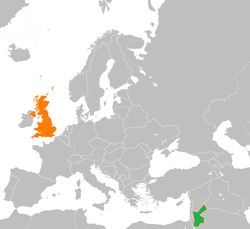Jordan–United Kingdom relations
Anglo-Jordanian relations refers to the relationship between the Hashemite Kingdom of Jordan and the United Kingdom of Great Britain and Northern Ireland. Two countries share a relatively close tie owning by the Hashemites, which received British helps to overthrow the Turkish rule in the country at the World War I, but also sometimes suffered tensions. Nonetheless, two countries were able to secure a strong relationship. Jordan has an embassy in London.[1] The United Kingdom has an embassy in Amman.[2]
 | |
Jordan |
United Kingdom |
|---|---|
History
During World War I, the Hashemites requested help and support from the British Empire throughout its official Near East headquarter administration in Cairo to fight against the Ottomans, which was materialized after 1916.[3] The sudden revolt led by the Hashemite family, while not be able to secure total support from other Arab tribes, played an instrumental role on the collapse of the Ottoman rule in there. However, the main goal of Hashemite's led-revolt, a complete unity and independence for an Arab state spanned from modern-day Iraq and Syria to further south of Yemen excluding Aden, was not honored by London and its French ally.[4] Eventually, as an apology to the failure, Britain placed Sharif Abdullah as ruler of the Emirate of Transjordan hoping to de-fuel tensions.[5]
Until 1956, the Emirate, while governed by the Hashemites, didn't have a complete independent administration. British Government still exercised influences across the Emirate. John Bagot Glubb, known as Glubb Pasha, was the de facto ruler in charge of the country, laid the foundation of Arab Legion, which would be known in the future as the Jordanian Armed Forces.[6] Meanwhile, Glubb Pasha played a controversial role, which is still on debate in the history of modern Jordanian Kingdom.[7]
At the Arab–Israeli War of 1948, Britain secretly favored a total Jordanian invasion of West Bank hoping to wipe out a possible creation of a Palestinian state led by Amin al-Husseini, in which, it was a success and secured British influence within Transjordan although their role has created an unwanted consequence in the future of the Middle East.[8] Britain would be later continuing to support Jordan at the Black September against the PLO,[9] though its support was questionable after its comment in distrust of the future of King Hussein.[10] Britain also secretly supported Israeli jets to fly in Jordan when Syria sent troops to invade the country, forcing the Syrians to retreat.[11]
King Hussein himself married Antoinette Gardiner,[12] a British woman who later gave birth to Abdullah II of Jordan. As for the result, Abdullah II has a British descent throughout his mother.
Modern ties
Thanked for this strong kinship and the later marriage between Hussein and Muna, Jordan and the United Kingdom maintain a strong relationship.[13] British PM Theresa May considered Jordan as a noteworthy ally, and was responded with the same mutual trust from the Jordanian PM.[14] Two countries also set to expand their bilateral ties.[15]
Both also involved at small-scale in the peace talk between Israel and Palestine as negotiator and urged for peace talk between.[16]
According from King Abdullah II, the relationship has already reached a high point to become true partnership.[17]
References
- "Home". Embassy of the Hashemite Kingdom of Jordan, London. Retrieved 19 March 2019.
- "British Embassy Amman". Gov.uk. Retrieved 19 March 2019.
- "For king and country". 17 July 2003. Retrieved 19 March 2019 – via The Economist.
- Khalid, Matein. "The Hashemite saga and the tragedies of Arab history". Khaleej Times. Retrieved 19 March 2019.
- "Jordan - History - The Making of Transjordan". Kinghussein.gov.jo. Retrieved 19 March 2019.
- "Glubb Pasha and the Arab Legion". Historynet.com. 12 June 2006. Retrieved 19 March 2019.
- Archives, The National (4 April 2017). "The National Archives - The Glubb Pasha papers: a precarious existence". The National Archives blog. Retrieved 19 March 2019.
- "Britain's role in the war in Palestine, 1948". Mark Curtis. 16 March 2017. Retrieved 19 March 2019.
- "Black September: Tough negotiations". 1 January 2001. Retrieved 19 March 2019 – via news.bbc.co.uk.
- "Britain Sees "Black September" as King Hussein's Downfall". Jewishvirtuallibrary.org. Retrieved 19 March 2019.
- "Saʿīd Ḥammāmī - Palestinian nationalist". Encyclopedia Britannica. Retrieved 19 March 2019.
- Scott (25 April 2014). "Princess Muna al-Hussein of Jordan". Retrieved 19 March 2019.
- "Jordan and the UK: A long and robust relationship". 6 November 2001. Retrieved 19 March 2019 – via news.bbc.co.uk.
- ""Britain will be a partner you can depend on" - PM in Jordan". GOV.UK. Retrieved 19 March 2019.
- "Jordan, UK set to take bilateral ties to new level". Jordan Times. 30 November 2017. Retrieved 19 March 2019.
- Laub, Karin (25 June 2018). "Prince William on historic Mideast trip, praises Jordan ties". AP NEWS. Retrieved 19 March 2019.
- "King: Jordan-UK historical bonds developed into true partnership - King Abdullah II Official Website". Kingabdullah.jo. Retrieved 19 March 2019.
Further reading
- Alon, Yoav. "‘Heart-Beguiling Araby’ on the Frontier of Empire: Early Anglo-Arab Relations in Transjordan." British Journal of Middle Eastern Studies 36.1 (2009): 55-72.
- Ashton, Nigel J. "‘A “Special Relationship” sometimes in spite of ourselves’: Britain and Jordan, 1957–73." Journal of Imperial and Commonwealth History 33.2 (2005): 221-244.
- Oren, Michael B. "A Winter of Discontent: Britain's Crisis in Jordan, December 1955-March 1956." International Journal of Middle East Studies 22.2 (1990): 171-184.
- Ovendale, Ritchie. "Great Britain and the Anglo-American invasion of Jordan and Lebanon in 1958." International History Review 16.2 (1994): 284-303.
- Tal, Lawrence. "Britain and the Jordan Crisis of 1958." Middle Eastern Studies 31.1 (1995): 39-57.
- Wilson, Mary Christina. King Abdullah, Britain and the making of Jordan (Cambridge University Press, 1990).
